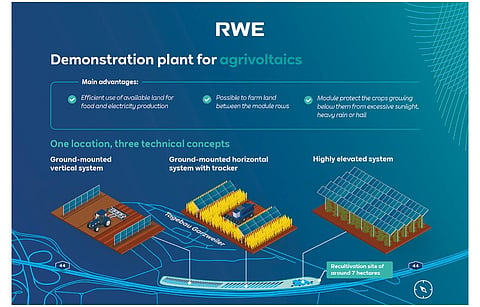

RWE, the German energy group, has commissioned an agrivoltaic project with 3 different configurations on recultivated land in Germany's North Rhine-Westphalia. This demonstration project will now serve as an application research site for the company for the next 5 years.
The 3.2 MW DC/2.5 MW AC project comprises 3 agri-PV concepts that enable both agricultural and horticultural use of the land. It is located at the edge of the Garzweiler opencast mine.
The 1st configuration has solar modules fixed and mounted vertically on the supporting structure. Under 2nd configuration, modules are mounted on a movable axis to track the sun as it moves from east to west.
For both these configurations, it plans to grow crops such as alfalfa, broad beans and forage grass during the 1st research year. It will be followed by sowing of crops like cereals, sugar beet, potatoes and other vegetables in subsequent years. There is enough space left for harvesting machines between rows of modules, it explained.
The 3rd combination comprises modules elevated on a substructure similar to a pergola, under which raspberries will be cultivated.
The first seedlings are planned to be planted in spring this year, following which research work will start on site.
Developed in cooperation with Forschungszentrum Jülich and the Fraunhofer Institute for Solar Energy Systems (Fraunhofer ISE), these installations will be studied to understand the interplay between plant growth and PV technology. These will be monitored under a variety of seasonal weather conditions.
Funded by the German State of North Rhine-Westphalia, the project was initially announced by RWE a year back in January 2023 (see 'Innovative' Demonstration Agrivoltaic Plant In Germany).
Agrivoltaics are seen as having the potential to positively impact the European Union's solar energy growth. According to a JRC report of October 2023, agrivoltaics can help the bloc achieve 944 GW DC installed PV capacity using 1% farmland (see Agrivoltaics Can Help Exceed Targets Under EU Solar Strategy).
Speaking of agrivoltaics, one of the leading names in the field, Germany's Next2Sun will discuss the use of heterojunction modules for its vertically installed solar systems, including for agri-PV installations, during TaiyangNews Special Focus Webinar on January 30, 2024. Along with Huasun Energy, Next2Sun will discuss HJT Solar Application Trends in Europe. Register free for the event here.
